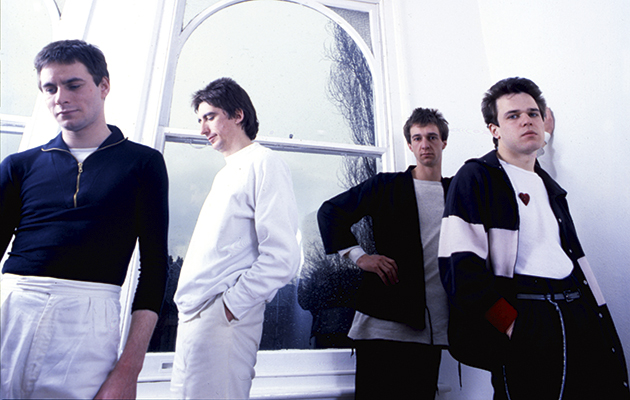THE IDEAL COPY
MUTE, 1987
After a seven-year hiatus, Wire reform and get deep into electronics and sequencing at Berlin’s Hansa Studio.
LEWIS: We decided we would use bass, drums and guitars again, though we’d been working with a far wider palette in other works. There would be no cymbals, so the whole thing was very stripped-back. The big decision was that we would not work with old material live. Quite honestly, I don’t think it felt that dissimilar from when we were making Pink Flag – back to the bunker mentality, really. I’d been playing bass with delay, which had a sort of disco groove to it, so that’s basically what I brought to the table. I think when we came to making the record, we had lots of different philosophies as to how records were made then, which made life quite tough. The unifying thing was when Gareth Jones took delivery of Steinberg sequencing, and I think we basically binned a month’s work and thought, “This is it.” At the time, that’s what everybody else was trying to grapple with, and it was a very unyielding technology. So I think everybody ended up sounding a little bit square at that time, in terms of sound and composition… loud snares and things like that. Hansa as a place was incredible, both because of its reputation and architecturally. We stayed there as well, so we had the run of the place. It was great.
_________________________
MANSCAPE
MUTE, 1990
The band’s seventh album, Manscape’s reliance on computers and drum machines soon led to Robert Grey’s departure, and another hiatus.
NEWMAN: The idea was to have something completely sequenced from the ground up. I think it’s regarded as being Wire’s worst album in a lot of quarters. We worked with Dave Allen, who was a bit like Eno – he was used to working with The Cure, which is basically one person, so he’d give them more ideas and vibe them up. The last thing Wire need is more ideas! There’s a genesis of a good album in there, but it’s very poorly mixed.
LEWIS: For Bruce, Colin and me, sequencers were the tools of the day. Rob never felt comfortable with it. He wanted to play drums, and he found that very stifling.
GREY: You get the feeling the drum machine is replacing the drummer, and everything is synchronised through the computer. You become programmers rather than players. I did try programming, but it didn’t have the same meaning for me. I started feeling, ‘Why am I here?’ I wasn’t going to go on tour to press a button on the drum machine.
_________________________
SEND
PINKFLAG, 2003
Wire reunite for their most aggressive album yet, “armour-plated” and constructed in Colin Newman’s studio.
LEWIS: We knew we couldn’t return with a record that was going to make us vulnerable to the press saying, “Oh God, it’s a bunch of lazy old fuckers who’ve come back…” So we made sure Send was armour-plated. It’s an interesting record – I don’t think there are any songs on it, and there are very few melodies.
NEWMAN: I’d been heavily involved in drum’n’bass in the ’90s. Dark drum’n’bass, like on the label No U-Turn, was the first time you could hear something coming out of dance music that had the tonality of rock. Plus there was the new rock, bands from New York, especially. Bruce and I worked on Send for one and a half years, two days a week. I did a piece called “First Fast”, which was a manifesto saying everything should be truncated, in your face. We made the pieces by addition – I didn’t compose songs. This was the first Wire record that was done in my studio.
LEWIS: When the album was made and the discussions were about how we were going to play live, that question was handed over to Rob. It was like, ‘Do you think you can play this?’, because the parts had been constructed in the studio, and I don’t think it drops much below 130bpm.
GREY: I don’t think everybody thought I should play – there was a hope I would use an Akai MPC sampler. Even though the drums sounded mechanical and industrial, they could all be played live. I said I could play it all, and they accepted that.



